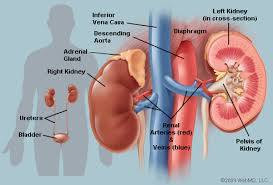(Dr Sujit Chatterjee Hiranandani Hospital) Why Your Kidney Health is Important?
According to Dr Sujit Chatterjee, our kidneys play a crucial role in maintaining overall health and well-being. These bean-shaped organs, located just below the rib cage on either side of the spine, are responsible for filtering waste products and excess fluids from the blood, regulating electrolyte levels, and producing hormones that help regulate blood pressure and red blood cell production.
Functions Of The Kidneys
Filtration Of Blood
One of the primary functions of the kidneys is to filter the blood, removing waste products and toxins that can build up and cause harm if not eliminated from the body.
Regulation Of Electrolytes
The kidneys help maintain the balance of electrolytes such as sodium, potassium, and calcium in the body, which is essential for proper nerve and muscle function.
Maintenance Of Blood Pressure
By regulating the volume of blood in the body and producing hormones such as renin, the kidneys play a key role in controlling blood pressure.
Production Of Hormones
The kidneys produce several hormones, including erythropoietin, which stimulates the production of red blood cells, and calcitriol, the active form of vitamin D, which helps maintain calcium balance in the body.
Common Kidney Disorders
Despite their importance, the kidneys are susceptible to various disorders that can impair their function and lead to serious health problems.
Chronic Kidney Disease (CKD)
CKD is a progressive condition characterized by the gradual loss of kidney function over time. It can be caused by conditions such as diabetes, high blood pressure, and glomerulonephritis.
Kidney Stones
Kidney stones are hard deposits of minerals and salts that form in the kidneys and can cause severe pain and discomfort when they pass through the urinary tract.
Urinary Tract Infections (UTIs)
UTIs occur when bacteria enter the urinary tract and multiply, leading to inflammation and infection. If left untreated, UTIs can spread to the kidneys and cause more serious complications.
Polycystic Kidney Disease (PKD)
PKD is a genetic disorder characterized by the growth of cysts in the kidneys, which can gradually replace healthy tissue and impair kidney function.
Risk Factors For Kidney Problems
Several factors can increase the risk of developing kidney problems, including:
High blood pressure
Diabetes
Family history of kidney disease
Advancing age
Smoking
Obesity
Signs and Symptoms of Kidney Issues
Fatigue
Feeling unusually tired or lethargic, even after getting enough rest, can be a sign of kidney dysfunction.
Swelling
Swelling in the hands, feet, ankles, or face, known as edema, can occur when the kidneys are unable to remove excess fluid from the body.
Changes In Urination
Changes in urination patterns, such as increased frequency, difficulty urinating, or foamy urine, may indicate underlying kidney problems.
Nausea And Vomiting
Persistent nausea and vomiting, especially when accompanied by other symptoms, can be a sign of kidney impairment.
High Blood Pressure
Uncontrolled high blood pressure can damage the blood vessels in the kidneys and contribute to the development of kidney disease.
Loss Of Appetite
A sudden loss of appetite or unexplained weight loss can be a symptom of kidney dysfunction.
Preventive Measures For Kidney Health
Taking steps to maintain kidney health is essential for preventing kidney disease and related complications. Some preventive measures include:
Drinking Plenty Of Water To Stay Hydrated
Eating a balanced diet low in sodium, processed foods, and refined sugars
Engaging in regular physical activity to maintain a healthy weight and blood pressure
Monitoring blood pressure and blood sugar levels regularly
Avoiding smoking and excessive alcohol consumption
Seeking Medical Help
If you experience any symptoms of kidney problems or have risk factors for kidney disease, it's important to seek medical attention promptly. A healthcare professional can perform tests to assess kidney function and recommend appropriate treatment options.
If you're considering a kidney transplant, then Hiranandani Hospital kidney transplant offers state-of-the-art facilities and experienced medical professionals to guide you through the process. With a focus on patient care and successful outcomes, Hiranandani Hospital is a trusted destination for kidney transplant surgeries.
Conclusion
Maintaining kidney health is vital for overall well-being and longevity. By understanding the importance of kidney function and taking proactive steps to protect and preserve kidney health, you can reduce the risk of developing kidney disease and enjoy a higher quality of life.
Faqs (Frequently Asked Questions)
How Often Should I Get My Kidneys Checked?
It's recommended to have regular check-ups with your healthcare provider, especially if you have risk factors for kidney disease.
Can Kidney Problems Be Reversed?
In some cases, early-stage kidney disease can be managed and progression halted with lifestyle changes and medical treatment.
Is Drinking A Lot Of Water Good For Your Kidneys?
Yes, staying hydrated is essential for kidney health as it helps flush out toxins and waste products from the body.
Are Kidney Problems Hereditary?
Some kidney diseases, such as polycystic kidney disease, have a genetic component and can run in families.
What Foods Should I Avoid For Kidney Health?
Foods high in sodium, potassium, and phosphorus should be limited for individuals with kidney disease or at risk of developing it.



Comments
Post a Comment